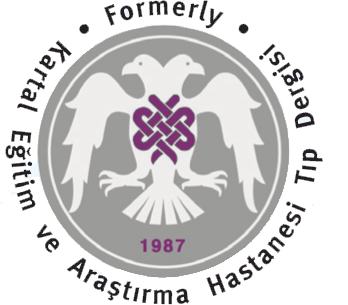An Examination of Conscientious Intelligence Based on Sociodemographic Aspects: A Study on Healthcare Professionals
Halim Ömer KaşıkcıYalova Provincial Directory of Health, Yalova, TürkiyeINTRODUCTION: Conscientious intelligence, unlike logical and emotional intelligence, can be defined as consulting ones conscience in making decisions, determining what is good and what is bad, and consciously choosing what is right. This study aimed to determine the differences in conscientiousness among healthcare professionals based on sociodemographic characteristics.
METHODS: This study was designed as a descriptive, cross-sectional study. Data were obtained using the Personal Information Form and the Conscientious Intelligence Scale. The Personal Information Form consists of seven questions and 32 items regarding the demographic characteristics of employees. Developed by Aktı and colleagues in 2017, the scale consists of 32 items and 7 subfactors. The study was conducted at a private hospital in Istanbul. The study population consisted of 380 employees. A convenience sampling method was
used. An attempt was made to reach all employees using the complete enumeration method during sampling. The study was conducted by reaching 277 individuals who agreed to participate in the study. Data were collected using a survey method from employees who volunteered to participate in the study. Data were analyzed using statistical techniques in SPSS.
RESULTS: The Cronbachs alpha value for the conscientious intelligence scale was found to be 0.87. This result demonstrates the reliability of the scale for the study. Of the participants, 84.1% were female, 63.9% were married, 35.5% had no children, 41.3% were between the ages of 26 and 34, 40.1% were high school graduates, 51.5% had less than 5 years of service experience, and 43% were midwives and nurses. The mean conscientious intelligence score was 121.28, and the standard deviation was 12.8.
DISCUSSION AND CONCLUSION: According to the research findings, the participants mean conscience intelligence scores were found to be high. It was concluded that the mean conscience intelligence scores of healthcare workers did not differ according to their socio-demographic characteristics, gender, and marital status. The mean conscience intelligence scores of healthcare workers varied according to their socio-demographic characteristics, such as number of children, age, educational status, length of service, and title.
Vicdani Zekanın Sosyodemografik Özelliklere Göre İncelenmesi: Sağlık Çalışanlarında Bir Uygulama
Halim Ömer KaşıkcıGİRİŞ ve AMAÇ: Vicdani zekâ, mantıksal ve duygusal zekâdan farklı olarak karar aşamasında vicdana danışarak iyiyi ve kötüyü bulmak ve bilinçli olarak iyiyi, doğruyu seçmek şeklinde tanımlanabilir. Bu çalışmada, sağlık çalışanlarının vicdani özelliklerinin sosyodemografik özelliklere göre farklılıklarını belirlemek amaçlanmıştır.
YÖNTEM ve GEREÇLER: Bu çalışma tanımlayıcı ve kesitsel tipte planlanmıştır. Veriler, Kişisel Bilgi Formu ve Vicdani Zekâ Ölçeği kullanılarak elde edilmiştir. Kişisel Bilgi Formu çalışanların demografik özellikleri yedi soru ve ölçekler kapsamındaki 32 maddeden oluşmaktadır. 2017 yılında Aktı ve arkadaşları tarafından geliştirilen Ölçek 32 maddeden ve 7 alt faktörden oluşmaktadır. Çalışmanın evrenini toplam 380 çalışan oluşturmaktadır. Örnekleme gidilirken tam sayım metoduyla tüm çalışanlara ulaşılmaya çalışılmıştır. Araştırmaya katılmayı kabul eden 277 kişiye ulaşılarak anket yapılmıştır. Veriler SPSS programında istatistiksel teknikler kullanılarak analiz edilmiştir.
BULGULAR: Vicdani zekâ ölçeği Cronbach alpha değeri 0,87 olarak bulunmuştur. Bu sonuç, araştırma için ölçeğinin güvenilir olduğu göstermektedir. Katılımcıların %84.1inin kadın olduğu, %63.9unun evli olduğu, %35.5inin çocuğu olmadığı, %41.3ünün 26-34 arası yaşta olduğu, %40.1inin lise mezunu olduğu, %51.5inin 5 yıl altında hizmet süresine sahip olduğu, %43ünün Ebe-hemşire meslek grubuna sahip olduğu görülmektedir. Vicdani zekâ ortalaması 121.28 ve standart sapması 12.8 olarak bulunmuştur.
TARTIŞMA ve SONUÇ: Araştırma bulgularına göre katılımcıların vicdani zekâ puanı ortalamaları yüksek seviyede bulunmuştur. Sağlık çalışanlarının vicdan zekâ ortalama puanlarının sosyodemografik özelliklerinden cinsiyet ve medeni durum değişkenlerine göre farklılık göstermediği sonucuna ulaşılmıştır. Sağlık çalışanlarının vicdani zekâ ortalama puanlarının sosyodemografik özelliklerinden çocuk sayısı, yaş, öğrenim durumu, hizmet süresi ve unvan değişkenlerine göre farklılık gösterdiği sonucuna ulaşılmıştır.
Manuscript Language: English




















